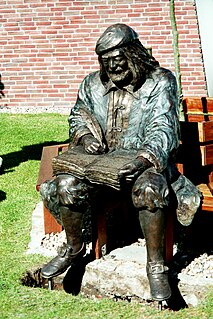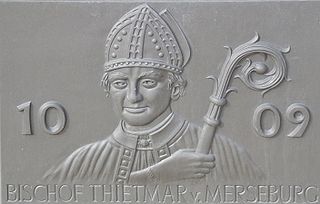 W
WAdam of Bremen was a German medieval chronicler. He lived and worked in the second half of the eleventh century. Adam is most famous for his chronicle Gesta Hammaburgensis ecclesiae pontificum. He was "one of the foremost historians and early ethnographers of the medieval period".
 W
WAlbert of Stade was a German monk, historian and poet.
 W
WPetrus Albinus was a professor at Wittenberg in Germany and is known as the father of Saxon historiography.
 W
WAndreas Angelus was a German clergyman, teacher and government inspector, known for his chronicles of the history of the Margraviate of Brandenburg.
 W
WJohann Carion was a German astrologer, known also for historical writings.
 W
WHelmold of Bosau was a Saxon historian of the 12th century and a priest at Bosau near Plön. He was a friend of the two bishops of Oldenburg in Holstein, Vicelinus and Gerold, who did much to Christianize the Polabian Slavs.
 W
WBlessed Hermann of Reichenau, also known by other names, was an 11th-century Benedictine monk and scholar. He composed works on history, music theory, mathematics, and astronomy, as well as many hymns. He has traditionally been credited with the composition of "Salve Regina", "Veni Sancte Spiritus", and "Alma Redemptoris Mater", although these attributions are sometimes questioned. His cultus and beatification were confirmed by the Roman Catholic Church in 1863.
 W
WJohannes Nauclerus was a 16th-century Swabian historian and humanist. He was born Johann Vergenhans to a noble man of the same name. As was the fashion of the time, the family's name had been Latinized, with nauclerus, meaning "skipper," being a close translation of Vergenhans, meaning "ferryman." The family's coat of arms depicted a man on a sailing ship.
 W
WJohann Adolf Köster was a pastor, teacher and historian in Büsum, Germany. He is better known by his Latin name Neocorus, under which he chronicled the medieval history of Dithmarschen. The Neocorus School in Büsum was named in his honor in 1995.
 W
WOtto of Freising was a German churchman and chronicler. He was Otto I Bishop of Freising as from 1138.
 W
WRegino of Prüm or of Prum was a Benedictine monk, who served as abbot of Prüm (892–99) and later of Saint Martin's at Trier, and chronicler, whose Chronicon is an important source for late Carolingian history.
 W
WUlrich of Richenthal was a chronicler of the Council of Constance.
 W
WThietmar, Prince-Bishop of Merseburg from 1009 until his death, was an important chronicler recording the reigns of German kings and Holy Roman Emperors of the Ottonian (Saxon) dynasty. Two of Thietmar's great-grandfathers, both referred to as Liuthar, were the Saxon nobles Lothar II, Count of Stade, and Lothar I, Count of Walbeck. They were both killed fighting the Slavs at the Battle of Lenzen.
 W
WWipo of Burgundy was a priest and writer. He was a chaplain to the Holy Roman Emperor Conrad II and may have acted as a tutor to his son Henry III, to whom he dedicated a number of works. His biography of Conrad II, entitled Gesta Chuonradi II imperatoris, is a key source for Conrad's reign.
 W
WCount Froben Christoph of Zimmern was the author of the Zimmern Chronicle and a member of the von Zimmern family of Swabian nobility. This article is based primarily on Beat Rudolf Jenny's biography of him.